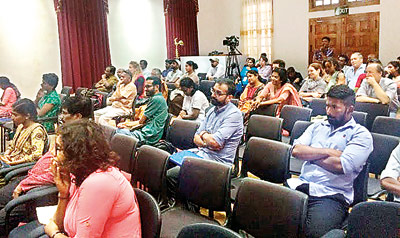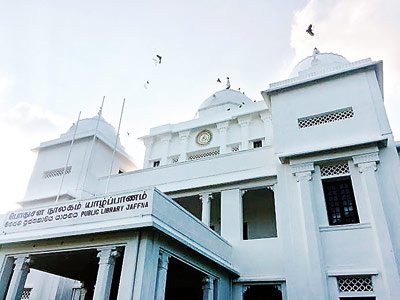Not quite a conversation ‘engaging’ the north
 The 2016 Fairway Galle Literary Festival drew to a close in Jaffna last weekend. Having unfortunately missed the main event in Galle, I was determined to catch at least the end of the festival, and thus found myself on an eight-hour bus ride through the night from Colombo to Jaffna.
The 2016 Fairway Galle Literary Festival drew to a close in Jaffna last weekend. Having unfortunately missed the main event in Galle, I was determined to catch at least the end of the festival, and thus found myself on an eight-hour bus ride through the night from Colombo to Jaffna.
Although I had worried about language barriers, on arriving in Jaffna, I quickly discovered that its residents could not only converse in English, their Sinhala was so impressive that it put my attempts at Tamil to shame.
The festival included nine panel discussions and talks that took place in Jaffna’s beautifully restored Public Library. I had not planned on sitting in on the entire programme but was immediately drawn in by the thoughtful and intimate atmosphere of the first session I attended –a discussion with Canadian author and playwright Padma Viswanathan on her novel ‘The Toss of a Lemon’.
Roughly based on stories her grandmother told her, Viswanathan’s novel delves into a Brahmin widow’s life and what she called the psychological intricacies of oppression.
“I wanted to put readers in an uncomfortable moral position,” said Viswanathan whose characters are as empathetic as they are sometimes perplexing in their devotion to the system.
Singaporean author Ovidia Yu had us laughing from the start in the next session where we were introduced to a most delectable cook and amateur sleuth, “Aunty Lee”. “She is not a busybody,” insisted Yu, “it’s just that everything that happens on the island is her business.”
Yu also spoke about the initial reception to ‘Aunty Lee’s Deadly Delights’ in Singapore where the book was repeatedly turned down by publishers due to its homosexual characters.
“They told me they could publish one, but not two homosexual characters,” she said. Following a reading of a moving section from her book, Yu emphasised the importance of normalising these characters through writing. “I don’t want to be seen as a gay writer. I’m a human writer from planet earth, who can only write from my body limitations and point of view.”
Unfortunately the performance by Grassrooted Trust scheduled for that evening was cancelled. Instead we were treated to a conversation between Nayomi Munaweera and Shyam Selvadurai, who discussed the role of empathy in creative writing, especially when writing about the island’s conflict where, as Selvadurai put it, “it’s almost taboo to imagine the other side”.
However, a young audience member who questioned passionately why no one was writing about Jaffna and the hardships they had endured during the war prompted more discussion on the need to encourage voices from the region and make the work of Tamil authors more accessible to Sinhala and English readers through translation.

The venue: The Jaffna public library
In fact, the Jaffna Literary Festival itself was about engaging the North in a conversation said Munaweera, but looking at the somewhat poor local attendance, I wondered how successful it had been in achieving this.
I was a surprised when two girls at the library stopped me to ask what was happening in the auditorium upstairs (where the festival sessions were held) and none of the locals I spoke to, who were all curious about why I’d come to Jaffna, knew about the festival.
Sunday morning’s panel discussion saw Indian journalist Rohini Mohan in a gripping session moderated by Ayathurai Santhan, where Mohan recounted the numerous interviews she conducted over a series of visits to Sri Lanka and the difficulty of later writing her creative non-fiction book, ‘The Seasons of Trouble’.
“I didn’t want to be blacklisted, or get the people I had interviewed into trouble. I didn’t publish anything for five years, but then people started making me feel accountable for the stories they had told me,” said Mohan.
The book focuses on the stories of three Tamil people and although fluent in Tamil, Mohan saw herself as an outsider because she didn’t inhabit the ideologies that came with speaking the language in Sri Lanka.
The festival concluded with a fascinating talk by English journalist and television presenter Jon Snow who touching briefly on his experiences reporting during the last stages of war in Sri Lanka, went on to talk about the “golden age of journalism” hailed by digital media.
Despite its heavy focus on the war and conflict in Sri Lanka, the Literary Festival in Jaffna was far from depressing. In fact, it felt respectful and right to be discussing these issues in Jaffna.
Hopefully, when it returns, the festival would have grown along with the region and would bring with it new voices and stories of Sri Lanka that can bridge some of the multilevel gaps that exist in our “multilingual” society.


